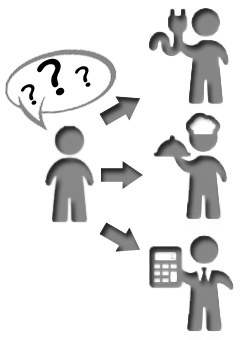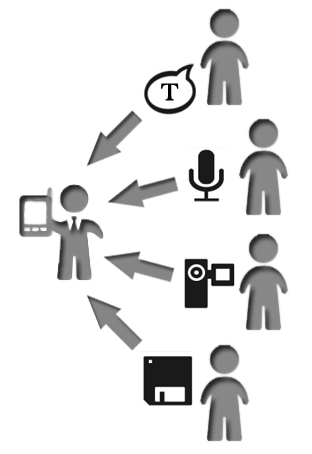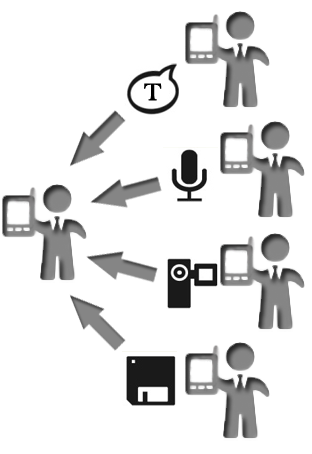Non-standard option of monetization of social services with the involvement of new users

Various social services, no matter how we represent them: communication programs (Skype, ICQ, Viber, Message me, Trillian), social networks (Facebook, Vkontakte, Odnoklassniki) are based primarily on their free. Attempts to monetize these services are reduced mainly to the sale of advertising. The classic monetization options have already been described earlier in Habré, right here: habrahabr.ru/post/126766
Some services do not monetize their products in any way, as they are afraid of losing existing users and scaring off new ones, and therefore they are suffering from
Let's start from a distance with the problem statement:
Currently, there are many social programs whose purpose is to communicate, exchange information with a certain circle of people: colleagues, acquaintances, friends, relatives, etc. At any time you can ask for help from your virtual friends, but there is little chance that they will help you in resolving the issue because of employment, lack of desire or the necessary knowledge.
Each of us knows what kind of area a specialist is and what can be useful for other people, and in our contacts, the records “Peter the lawyer” , “Julia the accountant” , “Nikolay car-care center” , i.e. we often sign people, focusing on their type of activity, so when we have problems with the law, we call our friend Petra, and when the car breaks down, then a friend, Nikolay. But what do you have problems with “installing the program on a computer” or when “there are a lot of viruses on it”? Or you have no experience in obtaining a visa? Or is your favorite bug's cheek swollen? Who to write or call if you have no acquaintance, geek, friend, tourist, veterinarian or turtles razvodchika?
After all, the answers to these questions can be obtained in social services, and quickly and targeted. At the same time, the one who asks the question gets an answer to it, and the one who answers also does not remain at the same time, and the service monetizes you. New users are already coming to you not just to talk to their friends "niochem", but also to get help quickly and be 100% sure that they will receive it. Ask how? About it a bit later, let's analyze analogs for now.
Some probably thought about Google (email) questions (otvety.google, otvet.mail) or about specific forums, but then let's first take a look at the shortcomings of such “waiting for answers”. Do not count for advertising, but here it is better to look in the direction of the service liveexpert: a specialized service, in which the advice provided is grouped into certain categories. In these categories are already spelled out topics for which you can get advice. But still, many of the questions that one encounters every day do not fall into already defined categories and may remain unanswered.
But the main obstacle for people who want to talk, to ask expert advice on liveexpert is that people help each other for money. Of course, it is necessary to encourage and stimulate specialists, but demanding money for consulting the same person as yourself, even if you are more knowledgeable in your area, is a definite obstacle. Some experts help for free, but they are much smaller, since, of course, people are not interested in wasting their time without getting anything in return.
It should also be borne in mind that we do not always need to consult with specialists of a certain field, because sometimes it is especially interesting to talk and ask questions to a person in online mode (or just talk to him), whose interests coincide with yours.
Structuring and complementing the above, we will describe the main problems and partly make a statement:
Critical moments.
Google-services (and partly liveexpert), a kind of offline question-answer: ask a question and wait a while for someone to answer it. It can last a day, two, a week, and sometimes even longer.
First : Waiting for an offline response may take a long time. But people want help here and now, that is, online.

You, the user who wrote your question, wait a long, long time. It takes a lot of time, but other users still do not write, although some of them know the answer and can help, but do not. Why? The answer is simple: each of us has a different stock of bare altruism, and someone is trying to help everyone, and someone is only constantly looking for help.
Second : Help should be encouraged. The consulting user must be sure that when he needs help on that or another matter, he will also be helped. I will especially emphasize the word “help”, the meaning of which is consultation for consultation, and not consultation for money. It is important that most people are not willing to pay money, but are ready to respond with goodness for good. Although the option of cash payment is for those who can not help themselves, and is ready only to ask others, but more on that later.

And somebody answers the question, but not at all and not at all, because a person who does not know the subject area of the question answers, from the category “I wanted to write something clever”.
Third : Each user of the system may have a list of what it may be useful to other users, indicating their interests, profession, other skills and knowledge that may be of interest and be useful. Full description will not only consult or advise, but will allow you to find an interlocutor for their hobbies. For example, the user wants to talk about the breeding of "Moscow dragons" and the features of care for them. Therefore, it should be possible to connect two people, or more people (users) for online communication, one of whom has been interested in and engaged in this topic for a certain number of years, and the other has just gotten himself a little drakosh.

Each of us has a certain character, degree of sociability, habits and conveniences; therefore, different people prefer different types of communication. For example, it is more convenient for someone to talk to a person directly, it is more convenient for another to form thoughts in a chat, the third one prefers video communication or a minimum of text, laying out a sufficient number of photos, pictures, schemes.
Fourth : Providing various types of online communication and message types. If someone at this stage had the idea that this service is a very heavy thing, please wait with the estimates and read to the end, or, if you really can’t wait, you can go to the last paragraphs, but here it’s still a little bit and analysis.

Imagine the situation. You are driving a car and suddenly something in the car is pounding or boiling. You can not determine the cause of this breakdown and do not know whether it is possible to continue the movement to the service station. In this situation, counseling is needed right now. Exit from the current situation: video chat with a specialist. Therefore:
Fifth : Mobility. Mobile client support for the most popular OS.

')
Solution of the task:
The solution of the task - maybe a refinement of one of the many free social services of communication, and now there are just dozens, if not more, of them on the Android OS (Viber, Messageme, gTalk, qip, Trillian) that implement online audio , video, text chat, file transfer, etc. I think that many readers are registered in at least one of these services, while others can easily supplement this list with a dozen of similar programs. Therefore, in order not to pull at the imagination, you can take as a basis the program with which you are well acquainted.
So, “Your” messaging program, when registering, uses the “Interests / Specialization” field in addition to the standard form (email, password, M / F ...). In this field, enter information for which we can contact other users ("Accounting", "Repair Audi", "Firebird"). (It would be possible to go into the jungle, telling about the relevance of the results in the drop-down list of interests, etc., but these are the details that we leave for those to whom it will be of particular interest).
After the data about yourself is filled, and you are registered, 100help-minutes arrive to us. You add a couple of friends to your contact list (communication with which is always free, like the program itself). Well and at once we will present that you needed advice of the veterinarian and you enter "veterinarian" and receive the list of all veterinarians sorted according to reviews of the people who already addressed earlier to this specialist. Choose the one you like most by rating (or by detailing the rating, then by questionnaire, feedback, experience), and then write / call / shoot online or send photos / video, all you need to solve the problem and upon completion of the call you understand:
1. The specialist did not help, then you expose him to minus karma with a description of the reason, and the help-minutes are not charged to you
2. The specialist helped, and you can not put anything in karma, because 10 minutes written off from you will increase to his minutes (for example, he has 40 of them) and he will have 40 + 10 minutes already, well, and karma will increase itself by a certain percentage, which will raise him in the rating.
So help-minutes is a catalyst for communication . Since “ear for ear” and “good for good” are accepted, the process also proceeds in this service, and the help-minute is received thanks from you (as a person who needs advice) to a specialist (the person who gave this advice). This is what will push a person to help other people.
Perhaps someone thought, why not add the right specialist as a friend. Now think: would you agree to be friends with everyone and add all your friends, then to provide free advice? Probably not. And add as friends only your acquaintances or those people whose advice you may need from time to time. Another person will agree to be friends with you and chat for free if it is interesting to him. Therefore, this is a kind of search mechanism for "our people" , with whom we periodically communicate and receive advice in both directions according to the principle "we are useful - we are useful . " "Their" veterinarians, doctors, lawyers, stylists, programmers, ... ists, ... arets, ... arets. If you suddenly stop responding at the other end, you can always again use help-minutes and seek advice from another specialist, and a person who has not helped you several times in a row and is on your contact list, while receiving advice only from you , you can always remove from the list.
It is also possible to give your personal help-minutes, based on a maximum of 100 per day, to the people to whom you are applying. For example: you turned to a lawyer, he helped you a lot, and you, in addition to the help-minutes that have already been written off, can give you 20 personal minutes of communication with you, because you are a good programmer and generally understand the technique, so you will not be sorry at all for giving any advice for such help.
And what to do if your help-minutes have accumulated, well, sooo much, and you are in all ratings so the first? You can give (change, donate) them to your friends if they ask. After all, if your friend has 20 minutes of personal communication with a good programmer, then you can exchange with a friend in the calculation, for example, he will give you 20 personal minutes of communication with “his”, proven programmer, and you will give him 15 help minutes of consultation with by all. "
What to do if all the help-minutes are over and urgently need help? Help-minutes could end because of unwillingness to help other users, or because of comprehensive ignorance and unwillingness (unfortunately, and maybe fortunately, I don’t know such cases in real life when a person doesn’t know anything and is not interested in anything, because to write " Fedya, wearing tight shoes ”, even if you can’t do anything - no one forbids it). And here is the process of monetization. A person who has spent all the help-minutes can purchase them separately and here for real money (for example, a minute is $ 0.1 or $ 100 for $ 5, and still it will be much less than on the liveexpert site described above, and you will be sure to get the answer to your question 100%).
And besides, it is nice when not only you can ask for help and get it, but when you yourself can be useful to someone . Over time, you will grow “your people” and you will know exactly who to write on what issue and who to contact if not for help directly, but to share “your people” and suggest “your” good lawyer, programmer, economist: Specialist!
The reason why this post was written
I was pushed by an interview on onliner with one of the leading developers of Viber, which said that they had a free application, no ads, etc., so they don’t earn, and in fact they could, without losing existing users, but only multiplying them. But the programs of audio-video-text communication (at least under the android) are sooo much, and they often differ only in the “arrangement of buttons”.
Of course, I didn’t get into the framework of the article not all the “goodies” of this service, for example, if you add the ability to “publish to everyone”, the answer question comes into public access on the Internet, on the service’s website (and for the topic on which it was found specialist) to be accessible to the whole community. For this, both the person who asked the question and the person who answered it receive additional free help-minutes. And imagine when a video appears on youtube titled “Swollen turtle cheek. What to do? <There is an answer>, ”and on the video you see a video conference with a specialist, in which you can see the symptoms of the problem and give an answer and its solution. I remind you that all this is added with one button “Publish to everyone”, without unnecessary gestures. And people who encounter the same problem will watch this video and find the answer in it - they will see the advertisement of your service, and they will install your Viber, MessageMe, Skype, Trillian, etc., not to talk with friends, but knowing that on occasion they will be able to get expert advice / advice.
I hope this service will be interesting not only for Skype-like programs, but for Google-like programs, namely the development of its functionality and breadth (the number of active users) and in depth (functionality and knowledge base).
I tried to set out the main points. There are still many goodies, but the article turned out to be already voluminous. And if it is also interesting, I will try in the next article to write the second part, and a few more “not standard”, but monetization options that are beneficial for users and developers.
And according to this article, it would be interesting to learn from you about the correlation “functional refinement / monetization / attraction of new users”.
Source: https://habr.com/ru/post/179229/
All Articles